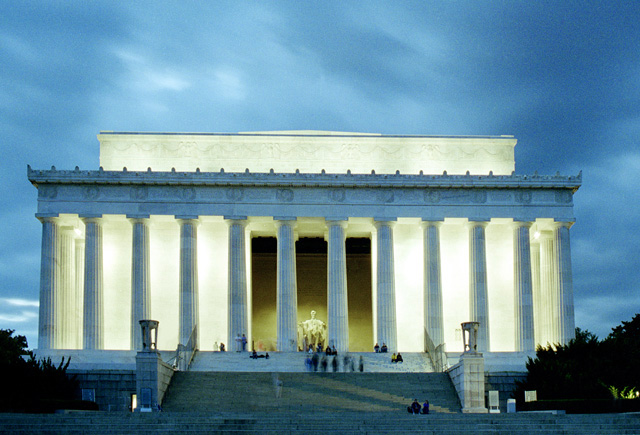This is the version of the Gettysburg Address inscribed on the walls at the Lincoln Memorial in Washington D.C.
THE
GETTYSBURG
ADDRESS
Fourscore and seven years ago our fathers brought forth
on this continent a new nation, conceived in liberty, and
dedicated to the proposition that all men are created equal.
Now we are engaged in a great civil war, testing
whether that nation, or any nation so conceived and so
dedicated, can long endure. We are met on a great battle-
field of that war. We have come to dedicate a portion of
that field as a final resting-place for those who here gave
their lives that this nation might live. It is altogether
fitting and proper that we should do this.
But, in a larger sense, we cannot dedicate…we cannot
consecrate…we cannot hallow…this ground. The brave men,
living and dead, who struggled here, have consecrated it
far above our poor power to add or detract.
The world
will little note nor long remember what we say here, but
it can never forget what they did here. It is for us, the
living, rather, to be dedicated here to the unfinished
work which they who fought here have thus far so nobly
advanced. It is rather for us to be here dedicated to the
great task remaining before us…that from these honored
dead we take increased devotion to that cause for which
they gave the last full measure of devotion; that we here
highly resolve that these dead shall not have died in vain;
that this nation, under God, shall have a new birth of
freedom; and that government of the people, by the people,
for the people, shall not perish from the earth.
November 19, 1863

Carl Sandburg's summary
In the words of the great poet and Lincoln-biographer Carl Sandburg:
He has stood that day, the world's foremost spokesman of popular government, saying that democracy was yet worth fighting for. He had spoken as one in mist who might head on deeper yet into the mist. He incarnated the assurances and pretenses of popular government, implied that it could and might perish from the earth. What he meant by "a new birth of freedom" for the nation could have a thousand interpretations.
The taller riddles of democracy stood up out of the address. It had the dream touch of vast and furious events epitomized for any foreteller to read what was to come. He did not assume that the drafted soldiers, substitutes, and bounty-paid privates had died willingly under Lee's shot and shell, in deliberate consecration of themselves to the Union cause. His cadences sang the ancient song that where there is freedom men have fought and sacrificed for it, and that freedom is worth men's dying for. For the first time since he became President he had on a dramatic occasion declaimed, howsoever it might be read, Jefferson's proposition which had been a slogan of the Revolutionary War - "All men are created equal" - leaving no inference other than that he regarded the Negro slave as a man. His outwardly smooth sentences were inside of them gnarled and tough with the enigmas of the American experiment.
From the Wikipedia page: http://en.wikisource.org/wiki/Gettysburg_Address
We recommed financial support for Wiki.